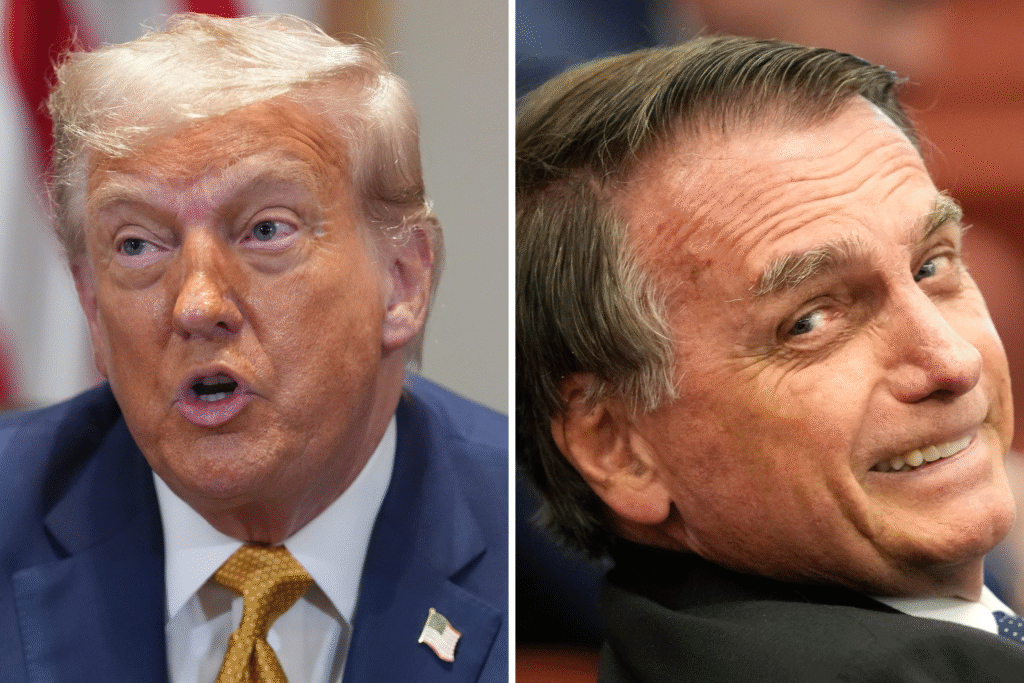Trump Threatens Brazil with 50% Tariff Over Bolsonaro Trial
On July 10, 2025, President Donald Trump announced a 50% tariff on Brazilian imports, citing the ongoing trial of former Brazilian President Jair Bolsonaro as a “witch hunt.”
The move escalates tensions between the U.S. and Brazil, with Trump demanding the trial’s end. Brazilian President Luiz Inácio Lula da Silva rejected the demand, warning of reciprocal tariffs and defending Brazil’s judicial sovereignty. This trade dispute, rooted in political loyalty, risks economic fallout for both nations.
Background of the Tariff Threat
Trump’s tariff announcement came in a letter to Lula, posted on Truth Social. He accused Brazil of attacking U.S. tech companies and unfairly prosecuting Bolsonaro.

The 50% tariff, set to begin August 1, 2025, targets all Brazilian imports, a sharp increase from the existing 10% “Liberation Day” tariff.
Trump’s move deviates from his standard trade letters, tying the tariff directly to Bolsonaro’s trial. Lula called the threat interference, vowing Brazil would not bow to external pressure. The U.S. enjoys a $6.8 billion trade surplus with Brazil, undermining Trump’s economic rationale.
What Is Bolsonaro’s Trial?
Jair Bolsonaro, Brazil’s president from 2019 to 2022, faces trial for allegedly plotting a coup after losing the 2022 election to Lula. The charges stem from a January 2023 incident when thousands of Bolsonaro supporters stormed government buildings in Brasília, aiming to overturn the election results.
Brazil’s Supreme Court accuses him of leading a “criminal organization” to undermine democracy. The trial, ongoing in 2025, could lead to prison time. Bolsonaro denies the charges, calling them political persecution. He’s also barred from running for office until 2030 for spreading false claims about Brazil’s voting system
Why Is Trump Targeting the Trial?
Trump and Bolsonaro share a close political bond, often compared for their right-wing populism. Both faced accusations of election interference after losing presidential races—Trump in 2020, Bolsonaro in 2022.
Trump calls Bolsonaro a friend, having hosted him at Mar-a-Lago in 2020. He views the trial as an “international disgrace” and a personal affront, mirroring his own legal battles. Trump’s support for Bolsonaro aligns with his broader narrative of defending allies against perceived judicial overreach. His tariff threat aims to pressure Brazil into dropping the case
The Tariff Threat Explained
Trump’s 50% tariff is one of the steepest in a series of trade actions against 22 countries, announced since July 7, 2025. Unlike other nations, Brazil’s tariff is explicitly linked to Bolsonaro’s trial, not just trade imbalances.
Trump claims the tariff addresses Brazil’s “unfair trade relationship” and alleged censorship of U.S. social media platforms. However, the U.S. trade surplus with Brazil weakens his economic argument. Trump offered an exemption if Brazil builds manufacturing in the U.S., a condition critics call unrealistic. The tariff could disrupt global supply chains, especially Brazil’s coffee exports, which account for over a third of the world’s supply.
Brazil’s Response to the Threat
President Lula rejected Trump’s demands, emphasizing Brazil’s sovereignty. In a social media post, he warned that Brazil would retaliate with its own tariffs if the U.S. follows through.
Lula defended the judiciary’s independence, stating, “No one is above the law.” Brazil’s Foreign Ministry summoned the U.S. chargé d’affaires to protest Trump’s statements. Brazilian officials, including Minister Gleisi Hoffmann, criticized Trump’s interference, recalling Brazil’s autonomy during Bolsonaro’s presidency.
The dispute has strained U.S.-Brazil relations, already tense after Trump’s earlier criticism of the BRICS summit hosted by Brazil.
The tariff threat risks sparking a trade war, with Brazil prepared to counter U.S. actions. Economists warn that a 50% tariff could raise U.S. consumer prices, particularly for coffee and agricultural goods.
It also signals Trump’s willingness to use trade policy for personal and political goals, raising concerns about economic stability. Brazil’s role in BRICS, which Trump calls “anti-American,” adds a geopolitical layer to the conflict.


 Trump Slaps Tariffs on Asian Nations, but India Secures Exemption
Trump Slaps Tariffs on Asian Nations, but India Secures Exemption  How Trump’s Policies Birthed Elon Musk’s America Party
How Trump’s Policies Birthed Elon Musk’s America Party  How Hakeem Jeffries Spoke 8 Hours to Challenge Trump’s Agenda
How Hakeem Jeffries Spoke 8 Hours to Challenge Trump’s Agenda  Why Trump’s Megabill Is Dividing House Republicans ?
Why Trump’s Megabill Is Dividing House Republicans ?  The Smell of Scandal: Trump’s Perfume Controversy
The Smell of Scandal: Trump’s Perfume Controversy  DRC President May Nominate Trump for Nobel Peace Prize
DRC President May Nominate Trump for Nobel Peace Prize